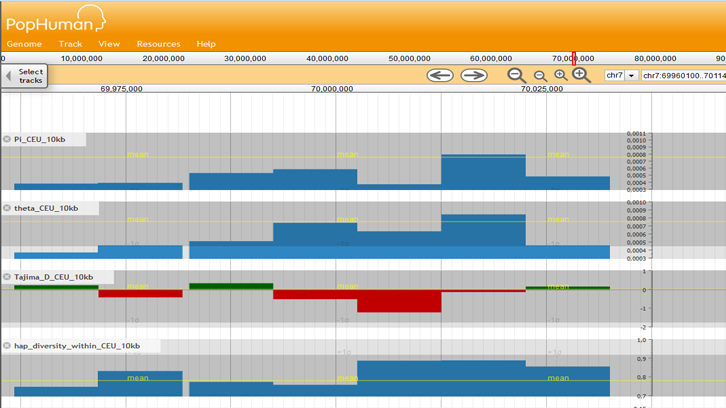PopHuman: a reference genome browser of the human genetic variation

There are not two genetically identical humans. On average, each of us is more than 99% genetically identical to any other person. The genetic variants that distinguish our genomes are present in different frequencies in different human populations. The populations that are geographically and ancestrally more distant tend to differ more, although it is the differences between individuals within populations, especially in the African ones, the most important quantitatively in the set of the human genetic variation.
The study of human genetic variation has significant evolutionary and medical applications. Not only does it allow us to determine the origin of humanity in sub-Saharan Africa hundreds of thousands of years ago and subsequent human migrations, but it also helps us to understand how certain genetic variants have contributed to the adaptation of human populations to their environment in the whole planet.
The description and explanation of the evolutionary forces that control human genetic variation within and between populations is thus a fundamental goal of population genetics. The international project 1000 genomes has output the most extensive global human genetic variation data set to date, providing 2504 complete genomic sequences from 26 populations and reporting a total of more than 84 million genetic differences. It is a unique resource in which to test the different hypotheses posed by molecular population genetics and eventually understand the evolutionary dynamics of genetic variation in human populations.
The research group Bioinformatics of Genomic Diversity of the Autonomous University of Barcelona (UAB), in collaboration with scientists from the Institute of Evolutionary Biology (IBE), have developed an exhaustive inventory of genetic diversity measures along the human genome from the data of the project 1000 genomes. This inventory captures the evolutionary properties of the sequences, and it is available to researchers through the PopHuman genome browser, an online portal that allows users to navigate the results through a graphical interface. PopHuman offers the most complete catalog of estimates of human genetic variation so far in terms of number of genomes and populations analyzed, and incorporates the genetic changes between the human and the chimpanzee genomes.
In this way, PopHuman allows to detect from relatively recent selective episodes, such as those related to the establishment of agriculture in European and Asian populations about 10 000 years ago, to older episodes that have recurrently occurred throughout of the last million years, such as the one observed in the region of the PRM1 gene, involved in the compaction of sperm DNA. PopHuman is the starting point for any exhaustive analysis of the different selective episodes that have taken place in the human lineage and that have left their mark on the genome.
PopHuman has been published this January in the prestigious journal Nucleic Acids Research and is freely accessible at the web address http://pophuman.uab.cat. In this link, you will find a detailed guide to learn to discover the adaptive history of human genes using PopHuman.
References
Casillas, Roger Mulet, Pablo Villegas-Mirón, Sergi Hervas, Esteve Sanz, Daniel Velasco, Jaume Bertranpetit, Hafid Laayouni, Antonio Barbadilla. PopHuman: the human population genomics browser. 2018. Nucleic Acids Research, 46(D1):D1003-D1010. https://doi.org/10.1093/nar/gkx943. Impact Factor: 10.162.

